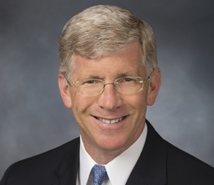
Daniel B. Poneman is president and chief executive officer of Centrus Energy Corp. He also serves on the company’s board of directors.
 From 2009 to 2014, Mr. Poneman was the Deputy Secretary of Energy, also serving as the chief operating officer of the U.S. Department of Energy. His responsibilities spanned the range of U.S. energy policies and programs – hydrocarbons, renewables, nuclear, and efficiency – including cybersecurity, project management, national security, and international cooperation. He was also responsible for the Department’s efforts on resilience and emergency response, in cases ranging from Fukushima to Hurricane Sandy. Between April 23, 2013, and May 21, 2013, Mr. Poneman served as Acting Secretary of Energy. Bio Cont.
From 2009 to 2014, Mr. Poneman was the Deputy Secretary of Energy, also serving as the chief operating officer of the U.S. Department of Energy. His responsibilities spanned the range of U.S. energy policies and programs – hydrocarbons, renewables, nuclear, and efficiency – including cybersecurity, project management, national security, and international cooperation. He was also responsible for the Department’s efforts on resilience and emergency response, in cases ranging from Fukushima to Hurricane Sandy. Between April 23, 2013, and May 21, 2013, Mr. Poneman served as Acting Secretary of Energy. Bio Cont.
1. As you look back at your time in the government, what is your proudest accomplishment?
In government as in business, your accomplishments are all a product of teamwork and so the pride really comes from contributing to a team that did important work.
In that spirit, I would say that during my time at the National Security Council (NSC) the proudest accomplishment would be the effort to address the North Korean nuclear threat triggered by Pyongyang’s March 1993 announcement that it was withdrawing from the Nuclear Non-Proliferation Treaty (NPT). Amid rising military tensions, and through intense negotiations directly with Pyongyang as well as a global diplomatic campaign, our team – led by Ambassador Bob Gallucci – negotiated an Agreed Framework that bottled up the North Korean plutonium production program for eight years. A close second would be the intense diplomatic effort to save the NPT from its possible demise by extending it indefinitely in the NPT Review and Extension Conference of 1995, so that it will remain the cornerstone of global efforts to combat the spread of nuclear weapons for generations to come.
At the Department of Energy, I would say my proudest accomplishment was chairing the Credit Review Board which, under intense deadline pressure, managed to approve $30 billion of federal loans and loan guarantees that led to the construction of the largest wind farm in the country, several commercial scale solar photovoltaic, solar thermal, and geothermal power plants, the first commercial nuclear power plant in the U.S. in 30 years, an advanced biorefinery, as well as electric vehicle manufacturing like Tesla and the Nissan Leaf. It was also gratifying to contribute to the all-of-government efforts to provide emergency assistance to Japan in the aftermath of the Fukushima nuclear accident and to the millions of Americans who were left without power in the wake of Superstorm Sandy.
2. The benefits of nuclear energy are largely accepted globally and this is an area that China hopes to develop as illustrated by a deal last year between China National Nuclear Corporation and its Russian counterpart Rosatom and to export via the Belt and Road Initiative (BRI). What are your thoughts on China’s nuclear objectives?
China now accounts for 28% of the world’s greenhouse gas emissions, more than any other nation. Therefore, China’s nuclear power objectives are critical to overall global efforts to avert potentially catastrophic climate change. Nuclear represents a major alternative to coal-fired power generation, which China has been adding for years to support its growing economy and population. From 2000 to 2016, that meant adding around 50GW of new coal-fired power generation – enough to power South Africa — each year. In 2017, China announced it was slowing the pace of coal-fired power expansion, but any way you look at it, China’s growing coal fleet will add prodigious amount of greenhouse gases for many decades to come.
That is why China’s decision to significantly ramp up its deployment of nuclear power, with 43 GW already on line and 13GW more under construction, is so important. Today the U.S. has more nuclear power capacity on line than any other nation; by 2030 China is projected to surpass that number. The International Energy Agency has said that meeting the target of preventing global warming from exceeding 2 degrees centigrade over pre-industrial levels will require the world to double the amount of installed nuclear power by mid-century; the success of China’s nuclear power program will be essential to meeting that goal.
3. China’s BRI is a high profile initiative for the Chinese government. What implications does it have for global energy diplomacy?
China’s nuclear program leads the world in scale and ambition, and China has already shown strong interest in expanding beyond its domestic effort to become a leading exporter of nuclear power plants. This undertaking is consistent with the geostrategic ambition of the BRI. Indeed, China’s investment in nuclear extends beyond the limits of the BRI; witness China’s investment in the Hinkley Point C nuclear power project in the UK and its bid to build reactors in Argentina. Since the nuclear power market is intensely competitive, with a relatively small number of suppliers vying for a small number of projects, China’s nuclear exports present a serious challenge to all other nations competing in that space. And since nuclear reactor projects extend to a century, once you factor in the time to plan, buy, build, operate, and decommission a reactor, the country that wins these deals can gain a major strategic beachhead from which they can build and expand their geostrategic influence. The countries that win these deals will also end up having great influence on how the nonproliferation conditions are written and how vigorously they are enforced. The implications for global energy diplomacy are therefore both powerful and long lasting.
4. What role do you see ahead for green finance in facilitating a greener global energy landscape?
Green finance is absolutely critical to facilitating a greener global energy landscape. On the supply side, many forms of green energy are capital intensive, where fuel costs are either small compared to the cost of a power plant (nuclear) or zero (wind and solar). So for those forms of power to compete effectively with carbon-emitting sources of power where upfront capital costs comprise a smaller fraction of the overall costs, access to advantageous financial terms is essential. This is especially true in light of the substantial subsidies that fossil-based fuels still enjoy all over the world.
The loan guarantee program of the U.S. Department of Energy shows the potential of green finance. Before that program was launched, there were no grid-scale solar photovoltaic projects in the United States. It was challenging for project developers to raise commercial capital to support those projects before they had an established track record, especially in the years following the 2008 financial crisis. The loan guarantee program financed five of those projects, bringing in new commercial lending in the process and providing sufficient confidence to the market that the next ten solar photovoltaic projects were financed entirely by the private sector.
Green finance can also provide instruments to support investments in energy efficiency, which is the cheapest way to produce a greener landscape. As they say, “negawatts are cheaper than megawatts.”
One of the reasons why China has been successful in deploying clean energy technologies domestically and exporting them around the world is China’s commitment to providing low cost financing. And, of course, the Paulson Institute has played a vital role in promoting green finance within China! If America wants to be competitive, we need to make sure that U.S. deployments and exports of clean energy technologies have similar options available.
5. Which living person do you most admire and why?
Brent Scowcroft. His wisdom, integrity, and decades of selfless public service have made the world safer and more secure. In a tumultuous and changing world, he has always managed to distill a clear-eyed sense of how best to advance U.S. strategic interests, and provided outstanding counsel to the presidents he served in support of those interests around the world – from the Iraqi invasion of Kuwait and the tragic events in Tiananmen Square to the demise of the Soviet Union and the peaceful reunification of Germany. He presided over a NSC process that is widely acknowledged to have been the most successful in history, serving as an unquestioned honest broker among such forceful personalities as Secretary of State Jim Baker and Secretary of Defense Dick Cheney, making sure that President George H.W. Bush received the benefit of a full spectrum of views and options, while quietly, yet effectively adding his own voice and judgment to help the president make the right decision. And despite his extraordinary success and gaining the respect and admiration of leaders around the globe, he has remained humble to his core and a wonderful friend and mentor to generations of foreign policy and national security experts.


